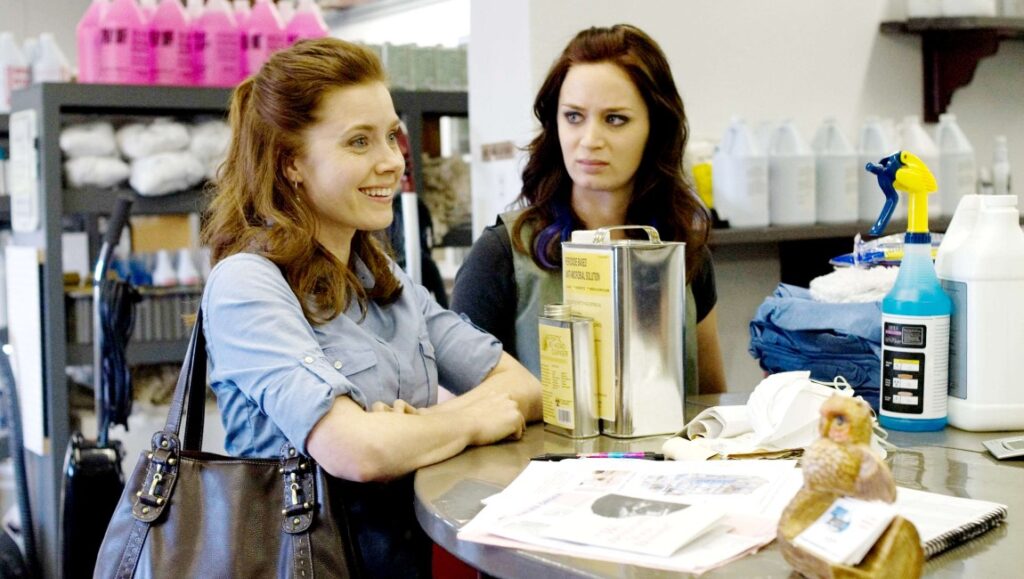Amy Adams is quite an actress. Excluding her forgettable role as the middle-nun in Doubt last year, Adams has turned in consistently compelling and nuanced work in a variety of roles — admittedly most are riffs on the same, rambunctious character. Her latest project, with fellow carrot-topped siren Emily Blunt, is unlikely to convert any of Adams’ detractors. Those who find her bubbly positivity to be obnoxious may actually like her less here, since it’s her first real, dramatic leading role. What is appealing about all these seemingly optimistic characters that Adams brings to the screen is their vulnerability.
A bit like Sally Hawkins’ Poppy in last year’s Happy-Go-Lucky, Adams’ character in Sunshine Cleaning is defined by much more than her beaming smile and cheery demeanor. Unlike Poppy, Adams’ character uses her optimism as a defense mechanism, or as a way of coping with difficult circumstances. Adams’ Rose is a single mom, involved in an affair with her married High School sweetheart, Mac (Steve Zahn), and struggling to make enough to raise her son, Oscar (Jason Spevack), by working a demeaning job as a housekeeper. She was once the envy of her classmates, as the head cheerleader, but now she serves them — in one scene, Adams painfully captures the embarrassment of cleaning an old classmate’s home. By most measures, Rose’s life is depressing, but she is “strong” and she “can do anything,” as she constantly tells herself in the mirror– sometimes even believing it. Predictably, her younger sister, Norah (Blunt), is just the opposite: a disenfranchised do-nothing who still lives at home and smokes a lot of dope. Norah runs through menial jobs and causes more stress for Rose than she is worth as Oscar’s babysitter. Not surprisingly, neither is happy, and so when Mac suggests they get involved in the crime-scene clean-up “racket,” both, desperate for cash, jump at this odd occupational opportunity.
Sunshine Cleaning is by-the-numbers indie-dramedy fare, complete with a twinkling, instrumental score that backdrops (in this case) montages of the two girls cleaning blood from shower stalls and tile walls– which is, at least to this viewer, both unsettling, and tonally off. Still, it’s the performances that make this formulaic material worthwhile: both Adams and Blunt are likable enough to carry this hackneyed screenplay. Adams is the main draw; luminous and graceful as always, there’s a heartrending rawness to the actress’s performance, and there are few in this line of work whose gaze is more alluring and emotionally penetrating. Blunt is nearly as good, playing Oscar to Adams’ Felix, and being appropriately ditzy and oft times vacant. The actresses play off each other well, and it’s the authenticity of their sisterly bond that makes Sunshine Cleaning more than the sum of its clichéd parts. Aside from a strict adherence to tried-and-true narrative structure, which makes the film too predictable, Sunshine Cleaning is largely without glaring faults.
However, there are a couple of egregious sequences: the opening scene, for one, which involves a suicide that could have just as easily been suggested rather than shown; a heavy-handed scene in which Rose attempts to speak to her dead mother through a car radio; and just about every scene with Alan Arkin, whose crotchety old geezer grandfather is ripped straight from Little Miss Sunshine, and makes comparisons between the two films (they also have the same producer and, uh, name) unavoidable. Other secondary characters are similarly ill defined, such as a lesbian doctor (Mary Lynn Rajskub) who befriends Norah after the two cross paths when the girls clean up after her dead mother. Ditto a one-armed store clerk (Clifton Collins Jr.) with a penchant for building model airplanes, who registers as more of a gimmick and as a vessel through which life lessons can be taught to Rose.
Thankfully, none of these failings are fatal, as Sunshine Cleaning keeps its focus clear and pronounced, examining the relationship between these two sisters, and developing their characters enough to hold interest. It’s far from a perfect film, and this Sundance-bred formula has, at this point, been stretched to the breaking point, but Adams is so good in the lead that she’s able to elevate the material.


Comments are closed.